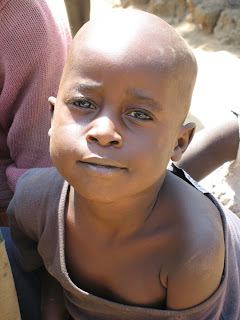

 Paicho IDP Camp
Paicho IDP Camp"What would it take to live as if neighbors, strangers, even enemies are brothers and sisters? To always protect women and children and to stand in the onslaught of every moment for something more beautiful than what we now believe in..." - UgandaRising
Call Congress to Pass Urgent Resolution Supporting Uganda Peace Talks
The historic Cessation of Hostilities (CoH) Agreement between the Government of Uganda and rebel Lord's Resistance Army is set to expire today, and without urgent action, northern Uganda will likely plunge back into the throes of violence and abduction. In response, we're asking you to join us in calling Members of Congress to sign a resolution introduced by Senator Feingold (D-WI) and Senator Brownback (R-KS), which calls on the Government and LRA to return to the peace talks, and for the U.S. to do all that it can to make sure this opportunity to achieve peace in northern Uganda is not lost.
WHAT TO SAY: Here is an example of what you can say: "Hi, my name is _____ from ______, and I'm calling Senator/Representative _______ to express my concern about today's expiration of the ceasefire in northern Uganda. I urge Senator/Represenative _____ to vote in favor of the resolution led by Senators Feingold and Brownback, which urges the Government of Uganda and rebel Lord's Resistance Army to resume negotiations and renew the ceasefire. The lives of two million people displaced by this conflict, and tens of thousands of abducted children depend on the success of these negotiations."
If you can, it helps to personalize the message; a personal connection emphasizes how important the issue really is to you.
WHAT TO EXPECT: Most likely, the staff members in the Congressional offices you call will just take down your name and zip code and thank you for your call. If they ask you for additional thoughts, you can say more about why you care about the crisis in northern Uganda, or consider mentioning some of the following points:
- The Juba talks are the most viable opportunity there is to achieve peace in northern Uganda, and with international attention, they can succeed.
- The U.S. should send an envoy to show support for the talks, and provide assistance to the team that is monitoring the ceasefire.
- The Ugandan military should also be expected to and assisted in protecting the millions of people in northern Uganda who have been displaced by the conflict.
A return to civil war, as may result from the expiration of the ceasefire truce, would yield disastrous results for the people of northern Uganda and for regional stability. Together, thousands of us will demand today that this new Congress shows moral leadership for peace in northern Uganda!
We will let you know as soon as possible if this resolution passes.
| Michael, Alison, Desiree, Paul & Peter The Uganda-CAN Team (202) 548-2517 |







